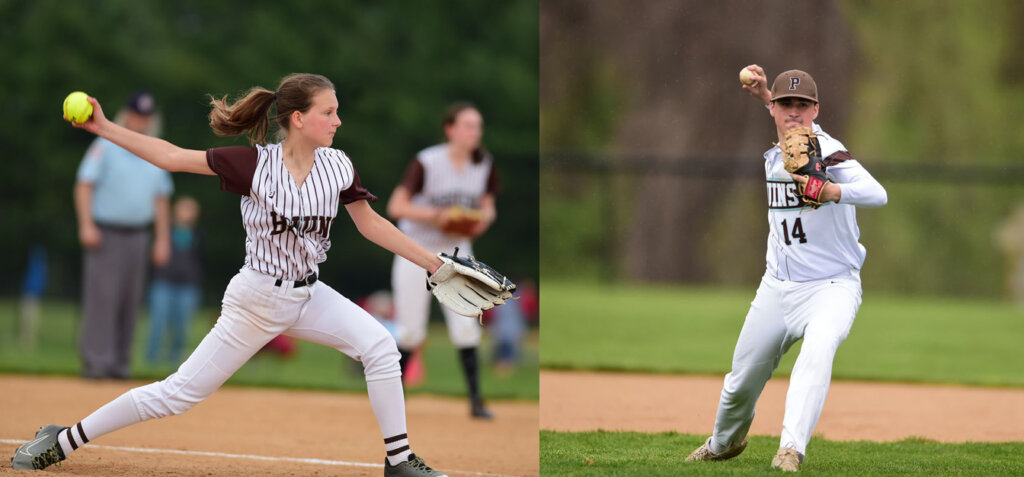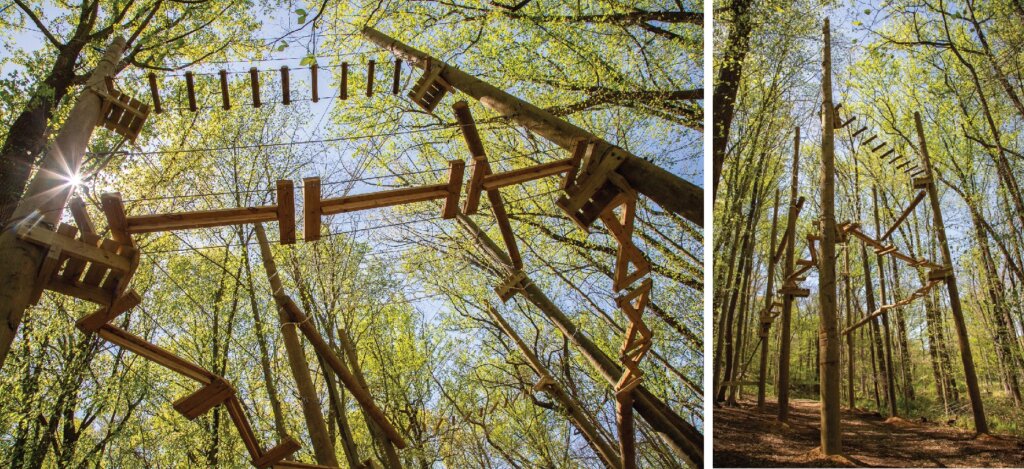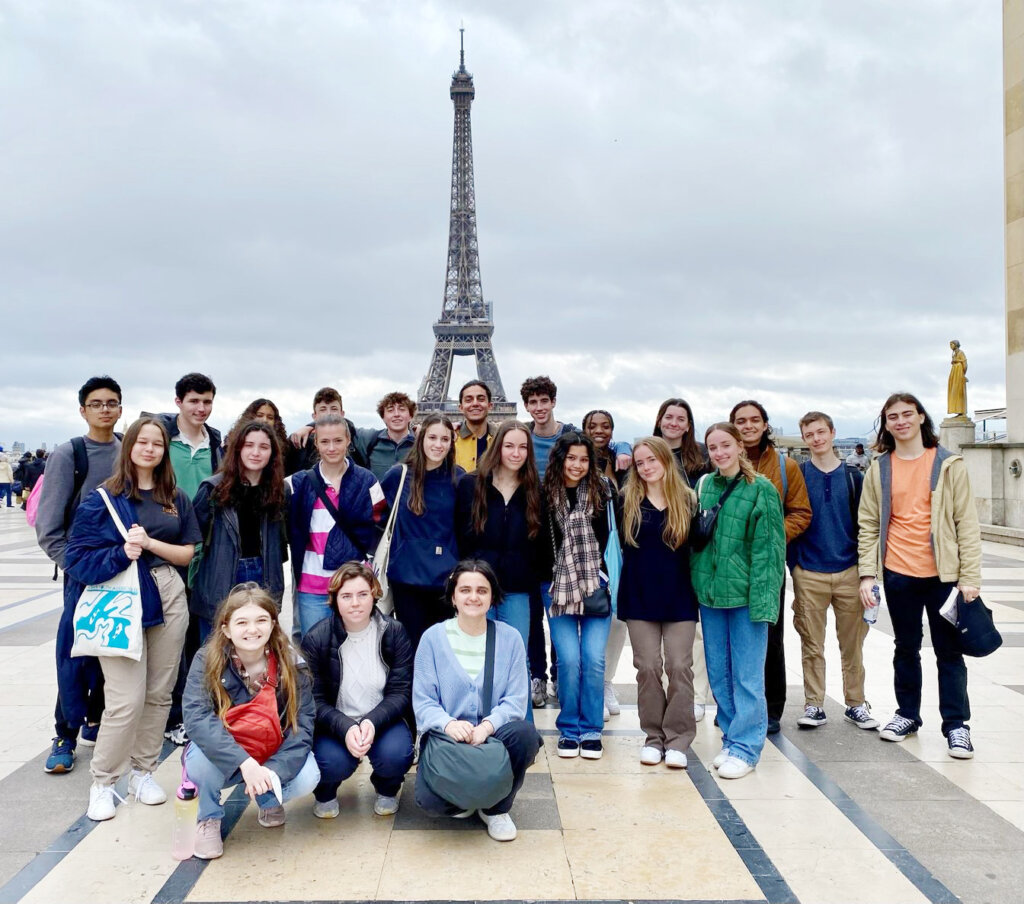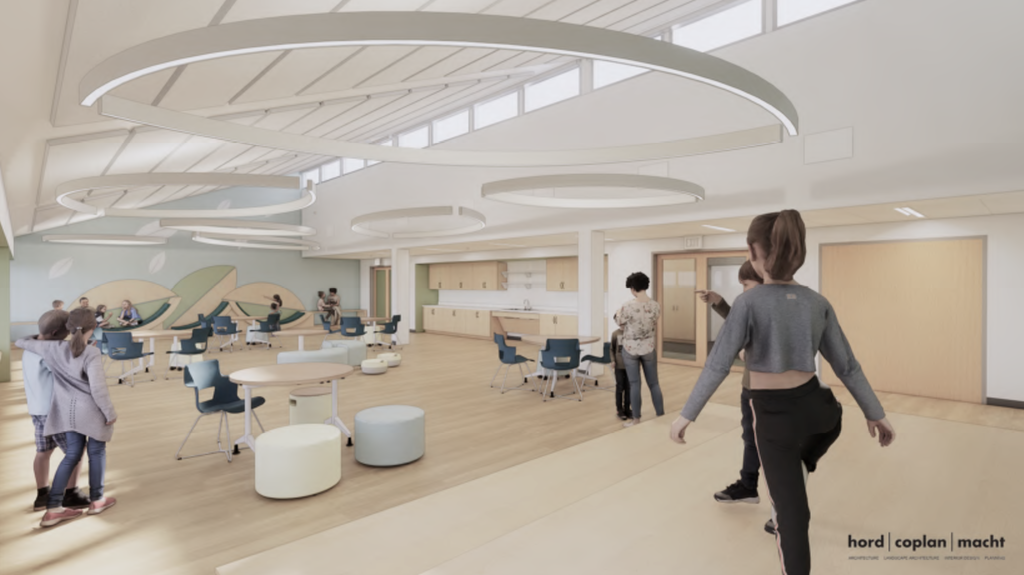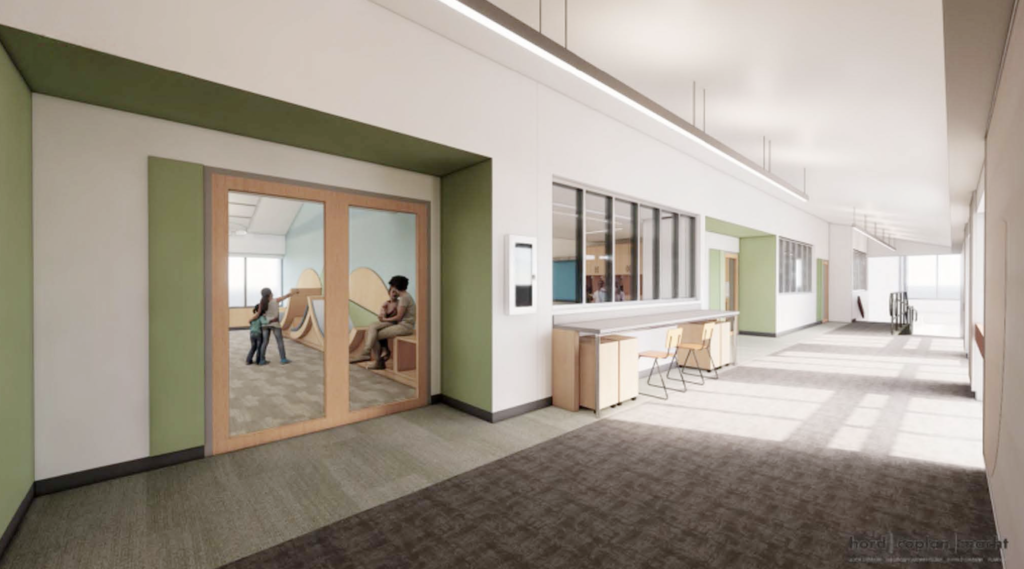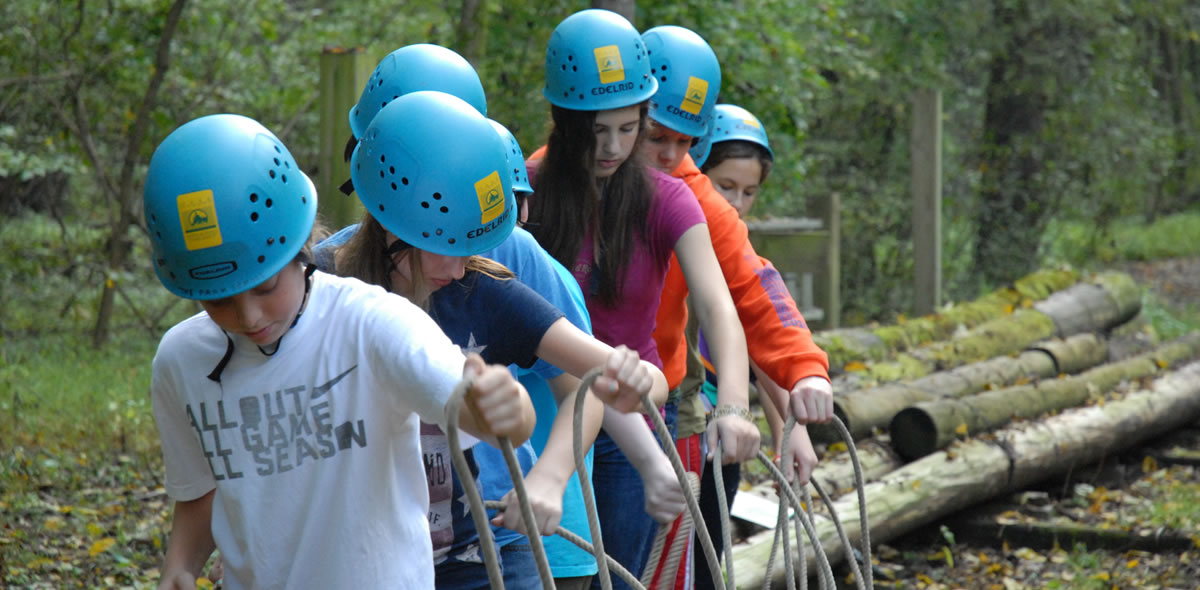Arts: Performing Arts
The Performing Arts program promotes a balance between process and performance.
There is an emphasis on student creativity, but all courses, whether production or process oriented, are designed to include careful attention to technique. The curriculum offers courses in acting, singing, recording, directing, set building, and performing. Opportunities for music performance include choral and instrumental ensembles. Productions typically include a musical on the main stage in Park’s Meyerhoff Theater and a variety of theatrical pieces in the Macks-Fidler Blackbox Theater.
Requirements
- Students are required to complete four semesters in the arts, although most take more. Ninth graders select one arts course each semester from foundation electives in music, theater, and the visual arts. They may also join instrumental and choral ensembles, participate in theater productions in winter and spring, and take advanced classes.
- For 9th Graders, the ensemble performance courses do not take the place of the two-semester art requirement.
- Upperclassmen must complete their arts requirements prior to the second semester of their senior year. Independent studies are limited and are only available to students who have fulfilled their arts requirement and wish to pursue advanced level work in an area of special expertise
- All students should read course descriptions carefully to determine eligibility. Accelerated courses are so designated.
Parkapella
Grades 9-12 • Pre- or corequisites: An audition and permission of the department. All singers must participate as amember of either Parksingers, Park Strings, Wind Ensemble, or Park Jazz Collective. Parkappella, Park School’s auditioned Soprano, Alto, Tenor, and Bass a cappella vocal ensemble, sings a variety of styles of music, ranging from contemporary to classical. A focus of the group’s repertoire in the 2025-26 school year will be study and performance of contemporary songs in genres ranging from R & B, to jazz, to current pop hits.
Students can enter the group with different levels of musical and vocal experience; all participants will leave with a strong sense of voice, a good ear, and an abiding love of song. Rehearsals take place twice a week during X block (see below), with additional practice times set up before major performances. While strong music reading skills are helpful, they are not a requirement: we are seeking singers whose musical taste and interests range from Alicia Keys, to Stevie Wonder, to the Beatles, Beethoven, and more!
• The group is composed of two sections: EightNotes (soprano, alto) and Vocal Chords (tenor, bass). Members of both sections will rehearse separately and also together as part of the wider Parkappella group.
• Students in Parkappella will also be members of either the EightNotes (Park’s soprano, alto a cappella group) or the Vocal Chords (Park’s tenor, bass a cappella group).
• Rehearsals: The rehearsals for Park’s a cappella groups: one rehearsal per week for Parkappella (combined soprano, alto, tenor, bass), one rehearsal per week for either EightNotes or Vocal Chords sections.
• As part of the class, students will be required to submit at least one a cappella arrangement of a song of their choice.
Parksingers
Grades: 9-12
Parksingers, a gender inclusive, non-auditioned, joyful, and versatile chorus, learns and performs a variety of traditional and contemporary choral music. The group rehearses three times a week and performs in assemblies for each division, evening concerts at Park, and community and sporting events. Students are encouraged to complete one music elective during their first three semesters in Parksingers.
Park Jazz Collective
Grades: 9-12 • Pre- or corequisites: Ongoing instrumental lessons and an audition.
Park’s Jazz Collective (PJC) is open to instrumentalists who are familiar with chord symbols and progressions, improvisation, and are interested in learning jazz styles and ensemble playing. PJC musicians work towards gaining and improving their improvisation skills and learning the language of jazz theory. Selections are from the jazz canon, world music, fusion, traditional, and contemporary styles. PJC represents jazz at Park in assemblies, bi-annual concerts, and public and community events including International Jazz Day. The group meets twice a week after school and aims for “playing in the pocket.”
Park Strings
Grades 9-12 • Pre- or corequisites: Instrumental lessons and permission of the department.
Park Strings explores a variety of classic and contemporary string orchestra and chamber music repertoire. Students expand their interpretive and technical skills, learn alternative styles, and develop ensemble skills through coaching and rehearsals three times a week. The group performs two concerts a year, as well as at numerous assemblies and the Goldsoundz concert series.
Theater Tech Crew Leadership
Grades 10-12 • Prerequisite: Students must work on the tech crew for one Upper School show before becoming eligible for Tech Crew Leadership credit.
This course is designed to give each student the opportunity to develop their leadership potential in the field of technical theater, including lighting design; sound design; set design/construction; props design/construction; scenic art/painting techniques; and stage crew. Students are given opportunities to apply and grow their knowledge by providing technical assistance for Park theatrical productions, assemblies, and events. The course will meet once a week during lunch, and a commitment to after school hours as part of the team for at least one of Park’s major productions is also a requirement. Students not in the class are still encouraged and welcome to attend work sessions and contribute their time and talent in a variety of ways!
Wind Ensemble
Grades 9-12 • Pre- or corequisite: Instrumental lessons and permission of the department.
Wind Ensemble is the smaller advanced concert band for students wishing to continue their participation in band in the upper school. Traditionally comprised of brass, woodwinds, percussion, string bass, and electric bass, the group plays a variety of styles from “classical” to contemporary. As instrumentalists, the class focuses on authentic engagement with ensemble playing and creating a balanced set of repertoire. Students work to improve their intonation, style, tone, blend, and technique to achieve a level of artistry. The group performs at least two major concerts, plays at community events throughout the year, and typically participates in a festival trip.
Performing Arts
Acting
Grades 9-12 • This course may be repeated with permission of the instructor.
Do you like to make others laugh? Do you like to tell enthralling stories? In Acting, students tell stories by living them. This introductory course will focus on basic acting techniques that professionals use in plays, movies, TV shows, and musicals. Through exercises and scene-work, students learn the fundamentals of playing truthfully within imaginary circumstances, to develop characters, create circumstances, analyze scenes for actions, play off of their partners, and personalize work by tapping into their own lives. They present a final scene to a live audience of friends at the end of the semester.
Beatz: Electronic Production
Grades: 9-12
Students learn to produce Hip Hop beats, soundtracks, dance, or other electronic music using a variety of software, including Ableton Live and Logic. The class focuses on MIDI and controller programming, drum machine sequencing, sampling, loop creation, synthesizer and production tricks, vocal processing, and basic musical harmony and form in the keyboard lab and the recording studio.
Comedy
Grades 9-12
Whether you’re the class clown or severely judgmental of the class clown, you have to admit, humor is part of what makes life, well… life. And believe it or not, there are “laws” to comedy! In this improvisation-based acting course, students will study famous comedians and cartoons, practice trips, falls, slaps, and other physical gags, and gush about things they love and loathe in weekly “harangues.” Different solo and group pieces developed by students during the course will be selected for a final performance at the end of the semester. No previous experience necessary.
Dance Technique, Performance and Production
Grades: 9-12
Calling dancers and anyone interested in dance! This course will explore and consider elements that go into the creation, rehearsal, and production of dance and dance/theater performance. Beginning with consideration of a variety of dance and movement styles, genres, and vocabularies, including modern technique and social dance, students will explore the body’s unique capacity to express and the way movement shapes their experience of the world. The class will consist primarily of studying dance technique in a range of styles, and students will also work with the process of generating and learning choreography. The semester will culminate in a performance of work choreographed and produced by students on subjects they choose. No previous dance experience is necessary.
Fall Production: Into The Woods
Grades 10-12 • Prerequisite: An audition and an entry-level class in acting or music or permission of the department.
This course is devoted to producing a full-scale musical. Students will read, analyze, and rehearse a musical to be performed in November. Actors will develop their characters, circumstances, and actions for the production while learning the music and further expanding their vocal technique. By participating in the production process, students will learn the standard practices of theater, learn to work as an ensemble, and challenge themselves with the demands of performance. This course will have after school and Saturday rehearsals.
Keyboards
Grades: 9-12
Are you interested in learning how to play keyboards? Are you already a keyboard player and want time to learn more and practice during the school day? Do you like to create your own music? Keyboards is a “come as you are” music class that welcomes students of all abilities and backgrounds and will expand the students’ knowledge and skills in keyboard technique, music theory, harmony, repertoire, and music technology. This class includes group activities as well as time to work on individual projects. Students have the freedom to choose their projects, make recordings, and create mp3 files that can be shared with others. Standard class projects include harmonizing simple tunes and reading through modern music using major and minor chord symbols.
Modern Music Band
Grades: 9-12
In this class, students will play and record modern (pop/rock/R&B) music. They will learn many aspects of what goes into creating great song arrangements and putting on an awesome show. Learning arrangements of songs suggested by the class, students will also have the opportunity to bring in original material to workshop with the group. They will also analyze the styles of different bands from the past and present to find out what elements make their songs work so well. Students will choose a main instrument to focus on and will also spend time working on their theoretical knowledge of their music through analysis and critique. Performances are planned for Goldsoundz in October and December. This class is open to anyone interested in developing their musical skills and knowledge — instruments include piano, guitar, bass, drums, vocals, sax, trumpet, trombone, clarinet, flute, violin, viola, and cello.
Music Theory and Composer’s Workshop 1 (Accelerated)
Grades 10-12 • Prerequisite: Permission of the department and a foundational music class.
Music Theory and Composers’ Workshop 1 is an in-depth look at musical relationships of pitches, rhythms, harmonies, and forms. Focuses include harmonic analysis, part-writing, secondary dominants and modulations, and composition exercises and projects. This accelerated course is for students interested in and passionate about theory, composition, and making music. Students will strengthen their abilities to recognize, utilize, analyze, and evaluate the elements and processes of music presented in a score. Interested students need a significant background in music, solid understandings in ear training and music theory, and access to a pitched instrument. Students who enroll in both semesters of this class will be prepared for the material in the Advanced Placement Music Theory test.
Popular Music of the Past 100 Years
Grades 9-12
The class offers an exciting deep dive into the music that has shaped the world over the past century. From the birth of jazz, blues, and rock and roll to the rise of hip-hop and electronic music, this course explores the artists, genres, and technological innovations that have defined generations. Through guided listening, reading, and writing about music, students will broaden their musical tastes and discover connections between artists and genres across decades. Whether students are musicians or just love discovering new sounds, this class will change the way they hear music.
Stagecraft
Grades: 9-12
This is a hands-on class where students will learn the art and skill of creating a theater production. Focusing on the different members of the production team and how they work together to bring a show from concept to production, the class will work first on the Upper School Musical, and then on the 8th Grade play. For each show, students will begin by reading and analyzing the script. Then, they will design, build, and paint the set. Finally, they will work on the lighting and sound. While there is no homework, this class requires a commitment outside of class, as students are expected to work on the production team for the musical.
Acting
Grades 9-12 • This course may be repeated with permission of the instructor.
Do you like to make others laugh? Do you like to tell enthralling stories? In Acting, students tell stories by living them. This introductory course will focus on basic acting techniques that professionals use in plays, movies, TV shows, and musicals. Through exercises and scene-work, students learn the fundamentals of playing truthfully within imaginary circumstances,
to develop characters, create circumstances, analyze scenes for actions, play off of their partners, and personalize work by tapping into their own lives. They present a final scene to a live audience of friends at the end of the semester.
Drumming and Percussion Workshop
Grades 9-12
This course will focus on developing each student’s skills or “chops” on drums and percussion instruments. Emphasis will be on familiarizing students with grooves and classic breaks while strengthening our rhythmic feel. Student derived music includes: Afro-Cuban Son/Rumba, Brazilian Samba/Bossa Nova, Rock, R&B, Hip-Hop, and student derived selections for
drumset. Students will also be able to get creative with rhythmic and melodic ideas in group playing activities on various instruments. Open to students of all levels who are interested in learning more about drumming.
Global Music and Culture
Grades: 9-12
Are you curious about what music sounds like from around the world? Do you want to know more about how music in its many forms has developed? Through this class, students will spark their musical curiosity and explore the different aspects of musical expression and cultural traditions across the globe. They will learn how to recognize, analyze, and discuss the different aspects of music through the lens of the many cultures.
Home Studio Production
Grades: 9–12
Professional level music and multimedia production has never been easier to accomplish at home. This course will focus on music production, audio engineering, and content creation specifically for a laptop. Students will record, compose, arrange, mix, and master band sessions and original compositions, learn the basics of producing commercials and short videos, live streaming and virtual event production, and content creation for YouTube and other digital platforms.
Improvisation for Instrumentalists
Grades: 9-12
In this class, instrumentalists will work to develop their voices as improvisers. By studying the musical vocabulary used by jazz, blues, rock, and country soloists, and their use of pentatonic scales, major and minor modes, arpeggios, and chromaticism, students will focus on bringing their techniques into their playing. Additionally, the class will explore the fundamentals of contemporary music theory in order to better understand how to “play through the changes.” Players will become acquainted with improv approaches on different instruments, work with different sized groups, and learn to develop their own background lines, and walking bass lines.
Keyboards
Grades 9-12
This course gives students a chance to learn and play those keyboard riffs that everyone recognizes. Students will develop the skills to get past those few riffs and move toward being a player with chops. Core components of this class will be understanding and performing from the rock, pop, R&B, gospel, folk, and jazz canons. Learn music from Beethoven to Bruno Mars. After an introduction to basic keyboard theory, students will learn to incorporate harmonies, bass lines, and improvisation techniques and develop their own accompaniments and grooves. Using the keyboard lab gives students access to unleashing the full capabilities of the digital audio workstation, synthesizer, mixing, and sequencing software. No previous keyboard experience is necessary, and the class is also open to students with previous experience, as the class will be geared to a range of levels.
Music Theory and Composers’ Workshop 2 (Accelerated)
Grades 10-12 • Permission of the department and a foundational music class.
Music Theory and Composers’ Workshop 2 is an in-depth look at musical relationships of pitches, rhythms, harmonies, and forms. Focuses include harmonic analysis, part-writing, secondary dominants and modulations, and composition exercises and projects. This accelerated course is for students interested in and passionate about theory, composition, and making music. Students will strengthen their abilities to recognize, utilize, analyze, and evaluate the elements and processes of music presented in a score. Interested students need a significant background in music, solid understandings in ear training and music theory, and access to a pitched instrument. Students who enroll in both semesters of this class will be prepared for the material in the Advanced Placement Music Theory test.
Ninth/Tenth Production
Grades 9-10 • Prerequisites: An entry-level acting class and an audition.
In this course, 9th and 10th Graders will read, analyze, and rehearse a play. Careful analysis of the play will provide a foundation for students to develop their characters, circumstances, and actions for the production. Students will explore the world of the play, its cultural contexts, and its particular theatrical style and, by doing so, will expand their own aesthetic awareness. By participating in the production process, students will learn the standard practices of theater, learn to work as an ensemble, and challenge themselves with the demands of performance. This course will have after- school rehearsals.
Spring Production
Grades 11-12 • Prerequisite: Audition. After-school rehearsals are a part of this course, and students cast as leads will not be able to participate in other after-school activities.
This course will be devoted to producing Henry IV, Parts 1 and 2, by William Shakespeare as a main stage production. Students will read, analyze, and rehearse the play. Careful analysis will provide a foundation for students to develop their characters, circumstances, and actions for the production. Students will explore Elizabethan aesthetics and cultural contexts, while connecting the work to their contemporary world. By participating in the production process, students will learn the standard practices of theater, learn to work as an ensemble, and challenge themselves with the demands of performing a full-length play. Students in the cast are required to take the English course, “Shakespeare: Page to Stage,” which will analyze the play and meets in the same block fall semester. Given the necessary time commitment, leads will not be able to participate in other daily after school activities in the spring. Students are recommended to have been in a Theater production or class before enrolling, and an audition is required.
Stagecraft: Explorations in Technical and Theatrical Design
Grades 9-12
This is a hands-on class where students will learn the art and skill of creating a theater production. Focusing on the different members of the production team and how they work together to bring a show from concept to production, the class will work first on the Upper School Musical, and then on the 8th Grade play. For each show, students will begin by reading and analyzing the script. Then, they will design, build, and paint the set. Finally, they will work on the lighting and sound. While there is no homework, this class requires a commitment outside of class, as students are expected to work on the production team for the musical.
